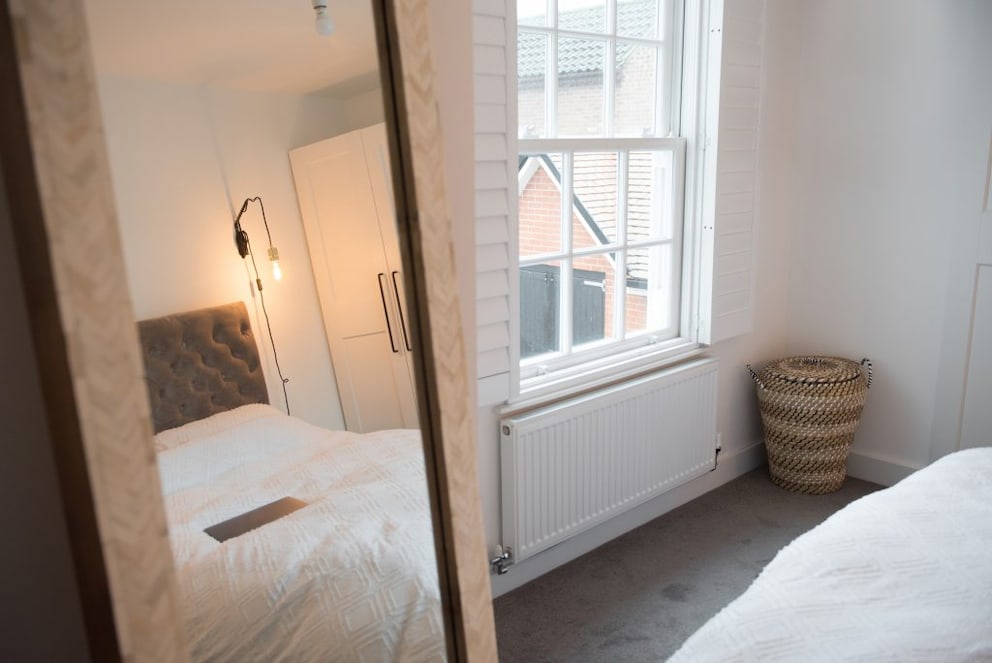March 4, 2024, 11:06 am | Read time: 3 minutes
Opinions differ when it comes to having a mirror in the bedroom. For some, it’s an essential part of the decor, while others prefer to do without it. In fact, a mirror in the bedroom has several drawbacks, writes myHOMEBOOK author Daniela Matsuzaki.
A mirror in the bedroom is not unusual in itself. It can even be very practical, such as for putting together the right outfit in the morning. Many bedroom closets also come with full-length mirrored sliding doors. Otherwise, a vanity with a mirror in the bedroom is not so far-fetched. Nevertheless, many people avoid having a mirror in the bedroom–and for good reason. Are all these interior design tips now obsolete? Or is it perhaps better to sleep without a mirror?
Overview
No Mirror in the Bedroom–Where Does the Theory Come From?
The theory of not having a mirror in the bedroom comes from the Chinese philosophy of Feng Shui, which focuses on harmonizing people and their environment. Feng Shui has become indispensable in interior design, as the philosophy has significantly influenced the concept of living spaces. The idea is to optimally integrate the five elements–water, wood, earth, fire, and metal–into the living space.
According to Feng Shui, a mirror is an important design element because it not only reflects light and enlarges spaces but also acts as an energy carrier. The position of the mirror is therefore essential. A mirror in the hallway can be very useful because it visually enlarges the space. However, a mirror should not hang opposite an entrance door, as this would lead the Chi, or good energy, out of the house.
Also interesting: 5 Unique Wall Shelves for the Bedroom
Mirrors in the Bedroom Are Not Sleep-Inducing
Is a mirror really not sleep-inducing according to Feng Shui? The stimulating energies circulating around the mirror play an important role. Since the bedroom should primarily provide rest, relaxation, and above all, healthy sleep, a mirror is not exactly optimal for sleep.

Better Sleep Without a Mirror?
A mirror can create a disturbing effect in the bedroom. However, there is another drawback: the back of the mirror is usually coated with a metallic layer. Metal conducts electricity, as well as electric, magnetic, and electromagnetic fields. This could potentially increase radiation exposure in the bedroom. Restlessness, sweating, and sleep disturbances could be the result. Another reason to banish the mirror from the bedroom!
If you don’t want to do without it, you should at least position the mirror in the bedroom so that you can’t see yourself from the bed. Alternatively, a cloth can be hung over the mirror.
Also interesting: 5 Interior Design Tips for a Modern Bedroom

How to make a first-floor apartment brighter

How to Achieve the Vintage Look in Your Bedroom

Scandinavian Bedroom Design: 6 Tips for Nordic Coziness
Bedroom Without a Mirror
Whether the quality of sleep is affected by a mirror in the bedroom has not been scientifically proven. However, as is often the case, it’s worth trying to see if you feel comfortable with it. Perhaps test it with and without a mirror for a week each.
If you find afterward that you sleep better without a mirror, you can still visually enlarge the room without one. Light wall colors or a light interior are suitable for this. Light textiles also make the room appear larger. By the way, you can find out which colors in the bedroom supposedly improve your love life in this article.

